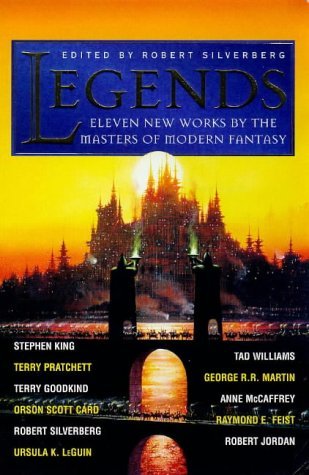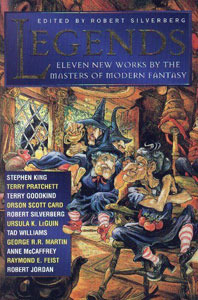Voyager, 1998, 591p.

This is a collection of fantasy stories set in the various worlds created by “the best known and most accomplished modern creators of fantasy fiction.” There are two cover paintings, the first one on the right is in the normal orientation, the one on the right below being upside down on the back cover.
The Little Sisters of Eluria by Stephen King. (Set in the milieu of The Dark Tower.)
A gunslinger staggers into town with his knackered horse, which promptly dies. He gets beaten up by zombies and handed over to a set of nurses who wish to feed on him and is saved only by the medallion he removed from a dead body earlier.
I’ve never read any Stephen King before – horror isn’t much my thing – and after this I doubt I’ll be reading any more. I wasn’t drawn in, nor was I engaged with the main character at all and as a result didn’t much care what happened to him. This story also betrays an inordinate fondness for the word mayhap. Four instances in fifty pages is at least three too many. Arguably four.
The Sea and Little Fishes by Terry Pratchett. (A Discworld story.)
Granny Weatherwax is asked not to compete in this year’s Witch Trials because she always wins. She accedes, graciously, and everyone else is spooked.
I have read some Pratchett previously and this is the mix much as usual, competently written, diverting, but not earth shattering.
 Debt of Bones by Terry Goodkind. (The Sword of Truth.)
Debt of Bones by Terry Goodkind. (The Sword of Truth.)
A young woman petitions The First Wizard for help to rescue her husband and daughter who have been captured by the evil invaders the D’Hara. For reasons of his own the Wizard assents, but not without seeming reluctance. From there the story unfolds as you might expect, though Goodkind throws in the odd twist or two. The resolution depends on the utilisation of magic; which is always bothersome. If anything can be done (no matter the cost in terms of deterioration to the health of the caster of the spells) then nothing is of consequence. In short, where is the real peril? And why was the good magic not used long since to prevent the bad situation occurring? (Except, of course, to provide us with a story.) On a less philosophical note, just before the climax of the story – the obligatory pyrotechnics and illusions – one of the enemy sorceresses, a Mord-Sith – is, unconvincingly I would have thought, fixated on her immediate task and as a result is overcome too easily. But this is required for plot purposes. In addition, the story’s dénouement is not as dark as the setup warrants.
Goodkind is also new to me. While his writing is readable, I wasn’t moved to seek him out further.
Grinning Man by Orson Scott Card. (The Tales of Alvin Maker.)
Alvin Maker and his companion, Arthur Stuart, meet a man who enters grinning contests with bears. (The winner gains power over the other.) They then travel on to a small town where they at first – due to the grinning man’s lies – encounter mistrust but are accommodated by a miller with dodgy business practices which Alvin eventually reveals with the aid of a bear. The bear, with Alvin’s intervention, has taken the grinning man as a kind of slave. This all sounds bizarre but within the tale it has its own logic.
I have read Card before; and was never enthused by him. This is entertaining enough, but slight.
The Seventh Shrine by Robert Silverberg. (Majipoor.)
Lord Valentine, now Pontifex of Majipoor, delighted to escape The Labyrinth to which his position normally confines him, investigates a murder in the former capital of the aboriginal inhabitants of the planet, the shapeshifting Metamorphs. The Metamorph archaeologist Dr Huukaminaan (or Huukaminaam; the two spellings appear annoyingly interchangeable) has been found dismembered in an ancient Metamorph religious site. Lord Valentine eventually solves the puzzle of the untimely death.
Silverberg is one of my favourite authors. His early stuff was standard 1950s SF but since his re-entry into the field in the late 1960s he has been a major figure, even at his worst never less than interesting. (Silverberg’s worst is always technically accomplished and a cut above the best of most writers in the SF and fantasy fields.) The Majipoor tales, which are from relatively late in his career, are entertainment. The Seventh Shrine duly entertains. Not vintage Silverberg though.
Dragonfly by Ursula K Le Guin. (Earthsea)
Dragonfly is the first female ever to be admitted to the establishment on the island of Roke where mages are trained. The reasons for this, her journey to that point, the reluctance of some of the mages to accept her, are rendered with Le Guin’s characteristic sympathy and attention to detail.
Le Guin is my favourite author of SF/fantasy. Her understanding of the human condition is profound. Her characters’ motivations are always clear and understandable. She can even overcome my reluctance to engage with stories which feature dragons.
The Burning Man by Tad Williams. (Memory, Sorrow and Thorn)
A young woman, Breda, whose widowed mother remarried but died a few years later, tries to understand the remoteness at the heart of her stepfather, Sulis, a political refugee from a foreign country, but one who has retained a retinue of armed guards. The burning man of the title is one of the old Powers, summoned by a witch under duress in order to relieve Sulis of his existential angst. Williams is also new to me. His writing here is impressive, particularly his invocation of the infatuated love affair Breda has with a young soldier, Tellarin. However, he gives his narrator a tendency not so much to foreshadow as to lay out future events. Fair enough, in that she is relating the defining time of her life from the perspective of old age but the habit was a more than a touch relentless and crucially failed to prefigure adequately Tellarin’s core and the choice Breda has to make at the climax.
The Hedge Knight by George R R Martin (A Song of Ice and Fire)
Dunk, squire to Ser Alan of Pennytree, takes over the old man’s possessions when he dies. Despite never having been dubbed he passes himself off as a hedge knight, Ser Duncan the Tall. He travels to a large tournament where he hopes to succeed in a challenge and thereby make his fortune. Along the way he picks up a stable lad, who seeks training as his squire. So far, so predictable. Martin, however, complicates and recomplicates his narrative – much as he does the larger Song of Ice and Fire cycle – to great effect. This world of aristocratic houses, heraldry, jousting, (some) chivalry and war, while a straight lift from history, seems to be rendered whole. Each walk on character is believable.* For a story this long, though, there are too many names. Too many Sers clump each other on the tournament field before we get to the point.
*Perhaps my familiarity with A Song of Ice and Fire helped.
Runner of Pern by Anne McCaffrey (Pern)
A young graduate carrier of messages between the various outposts of civilisation on Pern (the runner of the title) suffers a mishap in her first great long journey across the world. Her convalescence and medical treatment are described in detail as is her outfitting for the Gather to take place in the Hold where she is rehabilitating. There is little conflict, if any, only misunderstandings (telegraphed at that.) None of the characters are in any way wicked, sinful or bad. Nothing much happens here. Move on.
I read some McCaffrey many years ago, Dragonflight and The Ship Who Sang. This hasn’t encouraged me to enlarge that experience further.
The Wood Boy by Raymond E Feist (The Riftwar Saga)
Topped and tailed by a crude framing device which highlights the unreliable point of view in the main narrative this is the story of a young servant boy who survives the massacre of his household by another of its retainers and tracks the perpetrator (and the young girl who was his co-conspirator) both of whom die in the struggle that ensues when he catches up with them.
New Spring by Robert Jordan (The Wheel Of Time)
A long tale with two main viewpoint characters, Moiraine, one of the Aes Sedai who can channel powers and Lan, the now stateless King of the Malkieri, where a black sisterhood within the Aes Sedai is trying to prevent the coming of age of a boy who can channel. The familiar mayhem and bloodshed ensue. An unusual touch has a coup de grace in a magic duel not delivered by magic.
Feist and Jordan were also new to me but too generic for my tastes.
Overall I found this a bit of a slog. Some of the settings in Legends are arguably SF rather than fantasy ones but there is a tendency to stock mediævality in too many of the outright fantasies which I find both deadening and disheartening. Is the modern world so unappealing that the comfort of a hierarchical social order is a necessary palliative? Can no-one write a fantasy story set in the here and now?
But then, any sufficiently advanced magic would be indistinguishable from technology.
Legends II is on my tbr pile. It may be some while.












 Debt of Bones by Terry Goodkind. (The Sword of Truth.)
Debt of Bones by Terry Goodkind. (The Sword of Truth.)